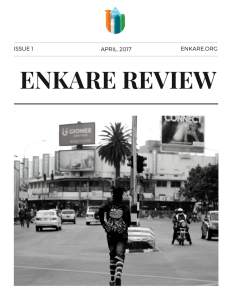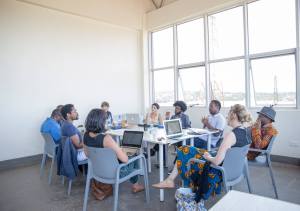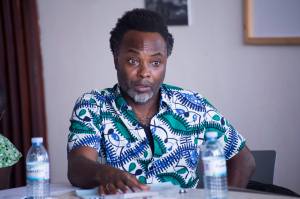AiW Guest Nathan Suhr-Sytsma
How does our sense of cultural and literary history shift if we start not from celebrity authors or landmark novels but from small magazines and the literary networks they foster? This question motivated the discussions of a group of academics, editors and writers who took up the long history of literary production across the African continent as part of the fifth annual Writivism Festival in Kampala, Uganda. Meeting daily from 16-20 August, 2017, this academic roundtable series was part of an AHRC-funded project called ‘Small Magazines, Literary Networks and Self-Fashioning in Africa and its Diasporas’ convened by Madhu Krishnan (University of Bristol) and Christopher Ouma (University of Cape Town). Many of the group’s members had first met at the University of Cape Town earlier this year to explore the history of small magazines in Africa, such as those memorialized in Cape Town-based collective Chimurenga’s online library of ‘independent pan-African’ periodicals.
The academic study of small magazines has largely emerged out of modernist studies. While modernist studies has produced laudable open access initiatives like The Modernist Journals Project, it has also tended to focus on the north Atlantic. ‘[G]uided by the desire to identify the national specificity and transnational translatability of the little magazine’, modernist scholar Eric Bulson’s recent book, Little Magazine, World Form (2017) broadens that purview to magazines originating in India, Japan, Nigeria, and Uganda. Bulson’s book includes the legendary Black Orpheus journal, founded in 1957 by Ulli Beier in southwest Nigeria, and Transition magazine, founded in 1961 by Rajat Neogy in Kampala, as part of this history of modernist experimentation with the magazine form. Even more so, though, the ‘Small Magazines’ project seeks to put African-based production rather than modernist form at the center of scholarly investigation.
While the topic of our initial conversation was the challenge of theorizing contemporary Spoken Word in cities as divergent as Kampala, Kigali, and Cape Town, the politics of Spoken Word were hard to separate from the topic of nationalism. As Khwezi Mkhize (University of Cape Town) put it, ‘What forms of nation are being imagined by Spoken Word?’ Observing that Nairobi-based Kwani? journal began to present Spoken Word poets on the page in a fresh way, Chris Ouma suggested that small magazines have always featured ‘generational conflicts’, in this case a departure from an earlier generation of African writers such as Ngũgĩ wa Thiong’o who believed that ‘fictions of state’ could be brought into existence through modern institutions. An older generation of Kenyans, added Billy Kahora (Kwani?), continue to talk about ‘Kenya’ as an ideal, whereas those of his own generation tend to agree that ‘the nation has not helped us up till now’. Given some older African writers’ inability to confront how the gendered division of labor compromised ideals of citizenship, we might look not only to women writers and younger writers, but also to the itinerant medium of the small magazine for what Ouma evocatively termed ‘a secret history of the nation’.
‘Cultural archives’, specifically the politics of access to archives for nonfiction writers and novelists, claimed our attention on the second day. Ugandan writer David Kaiza, who is drawing on historical maps and other archival materials for a novel in progress, observed that ‘the past is very much dependent on the present’; present concerns shape which aspects of the past we resuscitate in writing. Madhu Krishnan added a key pragmatic question: how do we archive contemporary collectives like Chimurenga or Kwani Trust? The biannual Kwani? Litfest documents the event itself but not the process that produces it, noted Kate Wallis (University of Exeter), so her research has sought to reconstruct this process through interviews. A more public model of archiving is provided by the Owaahh blog, which has been ‘archiving’ stories of Kenyan life and recently produced a well-received show based on these stories, Too Early for Birds, at the Kenyan National Theatre. In the absence of formal archives, curators like Owaahh, aka Morris Kiruga, have become crucial.
The group heard from two living archives – the writers, curators and editors Igoni Barrett and Dzekashu MacViban – during our third session, focused on the theme ‘Building Audiences’. Barrett recounted how, while he was in Lagos in hopes of collecting the proceeds from sales of his first book of stories (few were forthcoming), literary entrepreneur Muhtar Bakare offered him a job editing a new magazine. Bakare told Barrett that he wanted Farafina magazine to be a cross between Vanity Fair and The New Yorker for Nigerians, and it began life online. Bakare and Barrett found, however, that it was extremely difficult to sell the print edition to a general audience in Nigeria. The Harvard and Yale libraries would subscribe to a Nigerian magazine, but Bakare started the magazine in order to foster serious conversations among Nigerians. The magazine folded in 2009 amidst the global financial meltdown, and Bakare shifted his focus to the educational system and textbook publishing. Since then, former Farafina editors have founded such new publishing ventures as Narrative Landscape Press and Parrésia Publishers. (For more on Farafina Books and the Nigerian publishing scene, see Kate Wallis’s essay, ‘How Books Matter’.) ‘What is clear in Nigeria,’ concluded Barrett, ‘is that there’s a literary renaissance of sorts.’ What’s less clear is how to cultivate a sustainable market for print.
 After a similar magazine, Palapala, folded in early 2011, Dzekashu MacViban decided to found a new one ‘to fill the gap’ for critical and literary work alike in Cameroon. Bakwa magazine went online late in 2011, carrying work in English and Pidgin. (They accept submissions in French but publish these in English). Since then, they have collaborated with Mexico-based Ofi Press, initiated a quarterly series of public readings, engaged in a Literary Exchange project with Nigeria-based Saraba magazine supported by the Goethe-Institut in Lagos and Yaoundé, and started a Short Story Competition in partnership with Phoneme Media and the Goethe-Institut ‘to show people the depth and range of Cameroonian writing’ (it’s not just Mongo Beti!). They have also reached out beyond Cameroon and Nigeria: one of the Ugandan roundtable participants, Moses Serubiri, worked with Bakwa as an editor ca. 2013-15. MacViban said that Bakwa plans to launch a print anthology of eleven stories next year, their first foray toward a larger Bakwa Books publishing venture. In the meantime, interested readers can connect with Bakwa via their new @Bakwacast podcast series, which will encompass policy, science, and tech as well as literature and the arts.
After a similar magazine, Palapala, folded in early 2011, Dzekashu MacViban decided to found a new one ‘to fill the gap’ for critical and literary work alike in Cameroon. Bakwa magazine went online late in 2011, carrying work in English and Pidgin. (They accept submissions in French but publish these in English). Since then, they have collaborated with Mexico-based Ofi Press, initiated a quarterly series of public readings, engaged in a Literary Exchange project with Nigeria-based Saraba magazine supported by the Goethe-Institut in Lagos and Yaoundé, and started a Short Story Competition in partnership with Phoneme Media and the Goethe-Institut ‘to show people the depth and range of Cameroonian writing’ (it’s not just Mongo Beti!). They have also reached out beyond Cameroon and Nigeria: one of the Ugandan roundtable participants, Moses Serubiri, worked with Bakwa as an editor ca. 2013-15. MacViban said that Bakwa plans to launch a print anthology of eleven stories next year, their first foray toward a larger Bakwa Books publishing venture. In the meantime, interested readers can connect with Bakwa via their new @Bakwacast podcast series, which will encompass policy, science, and tech as well as literature and the arts.
The final discussion centered on ‘Print Culture’ across the long twentieth century. Khwezi Mkhize is investigating ‘radical print culture’ as a way to test the association between ‘print’ and ‘elite’. He brought up, by way of example, the Industrial and Commercial Workers’ Union, established in southern Africa in 1919, and their paper Black Man, which raises questions not only of class, but also of masculinity. Claire Ducournau (Université Paul Valéry – Montpellier) and Ruth Bush (University of Bristol) have researched three mid-twentieth-century glossy magazines founded by francophone writers. Ducournau told us that a magazine such as Awa: La revue de la femme noire, founded in 1964 by Annette Mbaye d’Erneville in Dakar, had an intellectual agenda of readerly improvement, as well as a political agenda in favor of women’s empowerment. According to Ugandan journalist Bernard Tabaire, Transition magazine similarly tried to elevate public debate while positioning itself for a general readership, although it ran more seriously afoul of those in power. Tabaire encountered Transition as a first-year university student in the 1990s and was so intrigued that he read the entire run of the magazine. A decade later, he wrote a paper on the press and political repression comparing the arrest and detention of Transition editor Rajat Neogy by Milton Obote’s government in 1968 with the twenty-first-century Ugandan government’s treatment of the press. For Tabaire, ‘A lot of the issues that are framed in Transition haven’t gone away’.
 Transition itself has not gone away either, having been revived at Harvard by Henry Louis Gates, Jr., in 1991. Its 2011 fiftieth anniversary edition, No. 106, was partly comprised of a special issue, ‘Reflections from Contemporary Uganda’, guest edited in Kampala by Elizabeth Palchik Allen and featuring such writers as Susan Kiguli, Monica Arac de Nyeko, David Kaiza, and Doreen Baingana – the latter two of whom participated in this year’s Writivism Festival. Since 2011, dozens of new platforms are carrying on the legacy of Transition in East Africa, including the groundbreaking intermedial Jalada collective and must-read online litmag Enkare Review. In fact, a Fear-themed Jalada/Transition joint issue was launched at the Writivism Festival – one of the contributors, Lillian Akampurira Aujo, was even present to read from her poetry in the issue – to mark the first time that Transition has been printed in East Africa since the late 1960s. Whereas ‘institution-building’ has often attracted suspicion from African audiences, observed Chris Ouma, we might look to small magazines like these to build the kinds of more inclusive and dynamic publics that are needed for a new century.
Transition itself has not gone away either, having been revived at Harvard by Henry Louis Gates, Jr., in 1991. Its 2011 fiftieth anniversary edition, No. 106, was partly comprised of a special issue, ‘Reflections from Contemporary Uganda’, guest edited in Kampala by Elizabeth Palchik Allen and featuring such writers as Susan Kiguli, Monica Arac de Nyeko, David Kaiza, and Doreen Baingana – the latter two of whom participated in this year’s Writivism Festival. Since 2011, dozens of new platforms are carrying on the legacy of Transition in East Africa, including the groundbreaking intermedial Jalada collective and must-read online litmag Enkare Review. In fact, a Fear-themed Jalada/Transition joint issue was launched at the Writivism Festival – one of the contributors, Lillian Akampurira Aujo, was even present to read from her poetry in the issue – to mark the first time that Transition has been printed in East Africa since the late 1960s. Whereas ‘institution-building’ has often attracted suspicion from African audiences, observed Chris Ouma, we might look to small magazines like these to build the kinds of more inclusive and dynamic publics that are needed for a new century.
 Nathan Suhr-Sytsma is Assistant Professor of English and Interim Director of the Institute of African Studies at Emory University. His first book, Poetry, Print, and the Making of Postcolonial Literature, was published by Cambridge University Press in 2017. Essays related to this project appear in the Journal of Commonwealth Literature, Research in African Literatures, and the Cambridge Companion to Postcolonial Poetry. He served as co-convener of the 2016 African Literature Association conference in Atlanta. He recently reviewed the ‘New-Generation African Poets’ 2016 chapbook set for Jacket2.
Nathan Suhr-Sytsma is Assistant Professor of English and Interim Director of the Institute of African Studies at Emory University. His first book, Poetry, Print, and the Making of Postcolonial Literature, was published by Cambridge University Press in 2017. Essays related to this project appear in the Journal of Commonwealth Literature, Research in African Literatures, and the Cambridge Companion to Postcolonial Poetry. He served as co-convener of the 2016 African Literature Association conference in Atlanta. He recently reviewed the ‘New-Generation African Poets’ 2016 chapbook set for Jacket2.
This is the second in a new series of articles publishing over the next six months on Africa in Words that come out of conversations between a new interdisciplinary network of researchers and literary producers examining the circulation and production of small magazines in Sub-Sahran Africa. This AHRC Research Network, ‘Small Magazines, Literary Networks and Self-Fashioning in Africa and its Diasporas’ is convened by Dr Madhu Krishnan (University of Bristol) and Dr Chris Ouma (University of Cape Town) and this year has hosted workshops in Cape Town (April 2017) and Kampala (August 2017) to explore the relationship between small magazines and the construction of affiliation, identity and civic participation. New research coming out of this network will be showcased at a conference hosted at University of Bristol in January 2018.
Read the first piece in the series: Sarah Smit ‘Finding Affiliations: Reading Communities, Literary Institutions & Small Magazines’.
Categories: Reviews & Spotlights on...


 Archives spotlight – Past & Present: Maryse Condé – ‘Segu’ and ‘The History of the Cannibal Woman’
Archives spotlight – Past & Present: Maryse Condé – ‘Segu’ and ‘The History of the Cannibal Woman’  Review: Connection and Legacy – Remembering ‘Before Them, We’ (2022)
Review: Connection and Legacy – Remembering ‘Before Them, We’ (2022)  Words on…Past & Present: The International Black Speculative Writing Festival (London & Remote)
Words on…Past & Present: The International Black Speculative Writing Festival (London & Remote)  Review: Tragedy and Resilience in Lagos – The Truth About Sadia by Lola Akande
Review: Tragedy and Resilience in Lagos – The Truth About Sadia by Lola Akande
join the discussion: